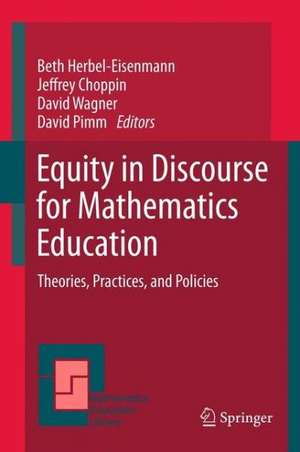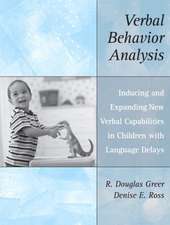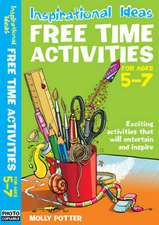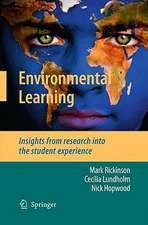Equity in Discourse for Mathematics Education: Theories, Practices, and Policies: Mathematics Education Library, cartea 55
Editat de Beth Herbel-Eisenmann, Jeffrey Choppin, David Wagner, David Pimmen Limba Engleză Paperback – mar 2014
| Toate formatele și edițiile | Preț | Express |
|---|---|---|
| Paperback (1) | 782.42 lei 6-8 săpt. | |
| SPRINGER NETHERLANDS – mar 2014 | 782.42 lei 6-8 săpt. | |
| Hardback (1) | 785.55 lei 6-8 săpt. | |
| SPRINGER NETHERLANDS – 10 dec 2011 | 785.55 lei 6-8 săpt. |
Din seria Mathematics Education Library
-
 Preț: 389.70 lei
Preț: 389.70 lei - 15%
 Preț: 645.96 lei
Preț: 645.96 lei - 18%
 Preț: 742.97 lei
Preț: 742.97 lei - 18%
 Preț: 1394.84 lei
Preț: 1394.84 lei - 18%
 Preț: 942.10 lei
Preț: 942.10 lei - 18%
 Preț: 1544.80 lei
Preț: 1544.80 lei - 15%
 Preț: 652.49 lei
Preț: 652.49 lei - 18%
 Preț: 1325.82 lei
Preț: 1325.82 lei - 18%
 Preț: 1225.48 lei
Preț: 1225.48 lei - 15%
 Preț: 643.34 lei
Preț: 643.34 lei - 18%
 Preț: 1221.07 lei
Preț: 1221.07 lei - 18%
 Preț: 952.89 lei
Preț: 952.89 lei - 18%
 Preț: 950.52 lei
Preț: 950.52 lei - 24%
 Preț: 1445.40 lei
Preț: 1445.40 lei - 18%
 Preț: 1224.54 lei
Preț: 1224.54 lei - 15%
 Preț: 651.19 lei
Preț: 651.19 lei -
 Preț: 391.61 lei
Preț: 391.61 lei - 18%
 Preț: 948.16 lei
Preț: 948.16 lei - 18%
 Preț: 944.19 lei
Preț: 944.19 lei - 18%
 Preț: 1380.95 lei
Preț: 1380.95 lei - 18%
 Preț: 947.85 lei
Preț: 947.85 lei - 18%
 Preț: 948.61 lei
Preț: 948.61 lei - 15%
 Preț: 635.31 lei
Preț: 635.31 lei - 15%
 Preț: 644.63 lei
Preț: 644.63 lei - 15%
 Preț: 646.43 lei
Preț: 646.43 lei - 15%
 Preț: 647.59 lei
Preț: 647.59 lei
Preț: 782.42 lei
Preț vechi: 954.17 lei
-18% Nou
Puncte Express: 1174
Preț estimativ în valută:
149.71€ • 156.31$ • 123.91£
149.71€ • 156.31$ • 123.91£
Carte tipărită la comandă
Livrare economică 04-18 aprilie
Preluare comenzi: 021 569.72.76
Specificații
ISBN-13: 9789400793651
ISBN-10: 9400793650
Pagini: 284
Ilustrații: XIV, 270 p.
Dimensiuni: 155 x 235 x 15 mm
Greutate: 0.45 kg
Ediția:2012
Editura: SPRINGER NETHERLANDS
Colecția Springer
Seria Mathematics Education Library
Locul publicării:Dordrecht, Netherlands
ISBN-10: 9400793650
Pagini: 284
Ilustrații: XIV, 270 p.
Dimensiuni: 155 x 235 x 15 mm
Greutate: 0.45 kg
Ediția:2012
Editura: SPRINGER NETHERLANDS
Colecția Springer
Seria Mathematics Education Library
Locul publicării:Dordrecht, Netherlands
Public țintă
ResearchCuprins
Preface.- Foreword: Discourse and equity: the simultaneous challenge of epistemological and social access: Jill Adler.- 1. Inherent connections between discourse and equity in mathematics classrooms: David Wagner, Beth Herbel-Eisenmann and Jeffrey Choppin.- Part A: Equity Concerns Draw Attention to Discourse.- 2. Context matters: how should we conceptualize equity in mathematics education?: Rochelle Gutiérrez .- 3. Exploring scholastic mortality among working-class and Indigenous students : Robyn Jorgensen .- 4. Mathematics learning in groups: analysing equity within an activity structure: Indigo Esmonde.- 5. Aiming for equity in ethnomathematics research: David Wagner and Lisa Lunney Borden.- 6. How equity concerns lead to attention to mathematical discourse: Judit Moschkovich.- Part B: Attention to Discourse Highlights Equity Concerns.- 7. Linguistic tools for exploring issues of equity: Mary Schleppegrell.- 8. Mathematics in multilingual classrooms in South Africa: from understanding the problem to exploring possible solutions: Mamokgethi Setati.- 9. Discursive demands and equity in second language mathematics classrooms: Richard Barwell.- 10. A discourse of telling and professional equity: Beth Herbel-Eisenmann.- 11. Studying discourse implies studying equity: Candia Morgan.- Part C: Implications and Policy.- 12. Equity, mathematics reform and policy: the dilemma of ‘opportunity to learn’: Donna Harris and Celia Anderson.- 13. Educational policy and classroom discourse practices: tensions and possibilities: Jeffrey Choppin, David Wagner and Beth Herbel-Eisenmann.- Afterword: Six Post-its in Search of an Author: David Pimm.- References.- Contributing Authors.- Index.
Notă biografică
Beth Herbel-Eisenmann serves on the Editorial Board of the Journal for Research in Mathematics Education, the Board of Directors for the Association of Mathematics Teacher Educators (AMTE), and the International Advisory Board of Mathematics Education and Society conference. In 2010, she was selected for the Early Career Award for the AMTE. <BR> <BR>
Jeffrey Choppin won the Presidential Award for Excellence in Mathematics and Science Teaching in 1995 and has served as Chair of the editorial panel for the Mathematics Teacher journal. <BR><BR>
David Wagner currently serves on the board of directors of For the Learning of Mathematics and as a member of the Nonkilling Science and Technology Research Committee. He has served on the steering committee for the Psychology of Mathematics Education, North American Chapter. <BR><BR>
In June 2010, when he retired, David Pimm was made professor emeritus at the University of Alberta, Canada and was editor of For the Learning of Mathematics for six years.
Jeffrey Choppin won the Presidential Award for Excellence in Mathematics and Science Teaching in 1995 and has served as Chair of the editorial panel for the Mathematics Teacher journal. <BR><BR>
David Wagner currently serves on the board of directors of For the Learning of Mathematics and as a member of the Nonkilling Science and Technology Research Committee. He has served on the steering committee for the Psychology of Mathematics Education, North American Chapter. <BR><BR>
In June 2010, when he retired, David Pimm was made professor emeritus at the University of Alberta, Canada and was editor of For the Learning of Mathematics for six years.
Textul de pe ultima copertă
Discourse practices warrant the attention of mathematics educators because discourse is the primary medium of education. Evidence about one’s hopes or expectations can be found in discourse practice whether the goal is performance in mathematical procedures, creativity in problem solving, or a classroom environment that uses the diversity of voices as a resource. Language, through implicit and explicit action, is the medium of mathematical development and the medium through which equity and inequities are structured and sustained. Given this inherent connection between discourse and equity, this book focuses on: a) the ways in which the social, mathematical, cultural, and political aspects of classroom interactions impact students’ opportunities to participate in the kinds of discourse practices that provide access to resources; and b) the perceptions and practices of educators, particularly the extent to which they view diversity as a resource and to which they are aware of structural inequities.
Caracteristici
Investigates the complex connections between equity and discourse Makes explicit connections between discourse and equity in mathematics education research Connects the research to policy implications?










